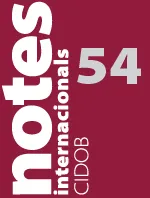Independent Azawad: Tuaregs, Jihadists, and an Uncertain Future for Mali

Notes internacionals CIDOB, núm. 54
- On March 21, 2012, just a month before the elections, a military coup d'état brought down the government of Mali, giving rise to a period of political uncertainty. The coup attempt was principally triggered by the armed conflict in which the Mali army had been facing off against the Tuareg National Movement for the Liberation of the Azawad (MNLA). The MNLA ended up proclaiming the independence of Azawad on 6 april 2012.
- Nine months before, in July 2011, the various sectors of the Tuareg family in the north of Mali had come together in a renovated political-military organization, giving rise to the MNLA. Together with 2,500 armed rebels, they fought against 200 Jihadists, with some talk of a supposed alliance between the MNLA and Al Qaeda in the Islamic Maghreb. Nevertheless, the alliance is said to be circumstantial, as important divergences exist between the Tuareg and the Islamist extremists.
- The objective of the Islamists is to apply Islamic law in the states of the region. The Tuareg represent a movement that clings to a national, not religious, identity, strongly impregnated with the values of democracy and secularization, consistent with a matriarchal society that practices a moderate Islam.
- The current situation in the north of Mali presents a danger for neighboring states. In the midst of an unprecedented humanitarian crisis, that to date has produced some 200,000 displaced persons, the great Tuareg family waits to see the evolution of the Azawad, above all in the north of Niger, in the Aïr region. With hardly any support and with the international community standing against the self-proclaimed Azawad, all the pieces are in place for the advent of a failed State, which could embargo the future and the security of the entire region.
(...)